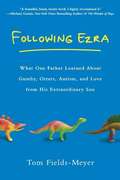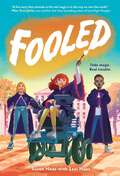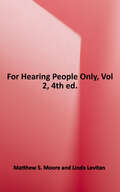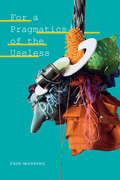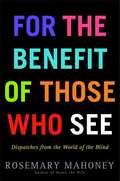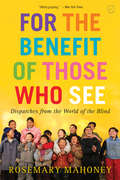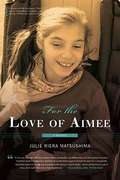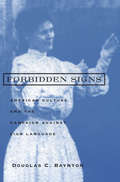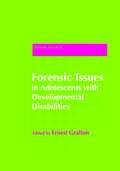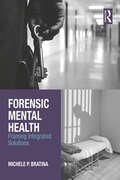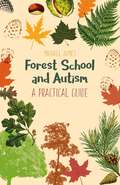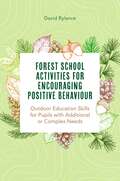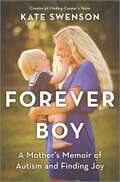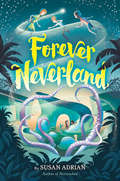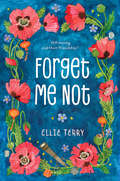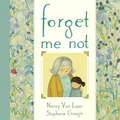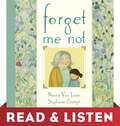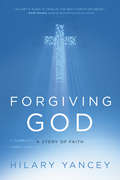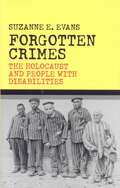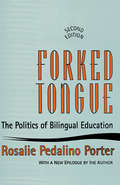- Table View
- List View
Following Ezra: What One Father Learned about Gumby, Otters, Autism, and Love from His Extraordinary Son
by Tom Fields-MeyerA very insightful book on Autism that brings alive a beautiful relationship between a father and son and also emphasizes that children need most is parents who love and appreciate them no matter what challenges they may face.
Food Allergy Advocacy: Parenting and the Politics of Care
by Danya GlabauA detailed exploration of parents&’ fight for a safe environment for their kids, interrogating how race, class, and gender shape health advocacy The success of food allergy activism in highlighting the dangers of foodborne allergens shows how illness communities can effectively advocate for the needs of their members. In Food Allergy Advocacy, Danya Glabau follows parents and activists as they fight for allergen-free environments, accurate labeling, the fair application of disability law, and access to life-saving medications for food-allergic children in the United States. At the same time, she shows how this activism also reproduces the culturally dominant politics of personhood and responsibility, based on an idealized version of the American family, centered around white, middle-class, and heteronormative motherhood.By holding up the threat of food allergens to the white nuclear family to galvanize political and scientific action, Glabau shows, the movement excludes many, including Black women and disabled adults, whose families and health have too often been marginalized from public health and social safety net programs. Further, its strategies are founded on the assumption that market-based solutions will address issues of social exclusion and equal access to healthcare. Sharing the personal experiences of a wide spectrum of people, including parents, support group leaders, physicians, entrepreneurs, and scientists, Food Allergy Advocacy raises important questions about who controls illness activism. Using critical, intersectional feminism to interrogate how race, class, and gender shape activist priorities and platforms, it shows the way to new, justice-focused models of advocacy.
Fooled
by Lexi Haas Susan HaasIn this fresh, funny, and fast-paced story, chaos ensues when a down-on-its-luck middle school comes to believe that fake magic is the real deal! Magic loving, wheelchair user Lil Evers wishes she could start sixth grade at a real wizarding school, instead of the worst junior high in her district. But when she leads her friends in roleplaying their own magic school in the Exceptional Children&’s (EC) class for special education, it helps the school days feel more bearable. When their magic wands end up scaring some bullies away in a chance encounter, the EC students&’ standing at school does a total 180. Students think their magic is actually real—and that Lil and her friends can grant their wishes with good luck charms! Strangest of all, the charms seem to be working… But it becomes clear that there&’s someone lurking who doesn&’t want the good luck to spread. Can Lil let go of her fantasy world to find her voice—and embrace her real school—before Willow Street Middle falls victim to an evil plan? From the co-authors of the critically acclaimed memoir The Year of the Buttered Cat comes an imaginative novel that shines a spotlight on the way the school system often fails students with disabilities—while showcasing the power of those very students to make positive change.
Footprints of Hope: VCFS (Velo-Cardio-Facial Syndrome)
by Raymond G. TannerThis book is a compilation of stories from Australia, France, Israel, New Zealand, South Africa, the UK and the USA. Along with other information about VCFS, it also tells Raymond Tanner's life story with VCFS (he was diagnosed with VCFS at age 43 and is now 54), the death of his son James 18 years ago from VCFS, his second son who is 16, and his trials and tribulations in growing up with the Syndrome.
For Hearing People Only
by Matthew S. Moore Linda LevitanThis best-seller answers some of the most common questions about Deaf culture, the Deaf community, and how Deaf people communicate and live. The simple and entertaining question-and-answer format makes this book a good introduction to Deafness and Deaf studies and would make a great gift for hearing friends and associates. Expanded edition.
For Hearing People Only (4th Edition): Vol. 1
by Matthew S. Moore Linda Levitan<p>In a handy question-and-answer format, <i>For Hearing People Only</i> addresses some of the most commonly asked questions about deaf people, their community and their language. The 4th edition has been expanded into two volumes—containing more content than ever! The <i>For Hearing People Only</i> 4th Edition is almost double the size as the previous edition! That means more questions, more answers and more content. It has been expanded into two volumes, and reflects changes in technology and telecommunications. <p>Concise, easy-to-read and designed for those with no prior background, <i>For Hearing People Only</i> makes a formidably complex subject accessible. Each chapter can be read as an independent unit. This is the first book of its kind—written especially for laypeople who are curious about deaf people, and would like to separate truth from stereotype, fact from misconception, reality from myth. <i>For Hearing People Only</i> makes a good introductory or supplemental text for Deaf studies or signing and interpreter students.
For Hearing People Only: Answers to Some of the Most Commonly Asked Questions About the Deaf Community, Its Culture, and the "Deaf Reality" (newly revised and expanded)
by Matthew S. Moore Linda LevitanA question and answer book to those questions that the general public wants to know about Deafness, the Deaf culture, and what it is like to be Deaf in America.
For Hearing People Only: Answers to Some of the Most Commonly Asked Questions about the Deaf Community, Its Culture, and the "Deaf Reality" (Third Edition)
by Matthew S. Moore Linda LevitanHere, in a handy question-and-answer format, are answers to some of the most commonly asked questions about deaf people, their community, and their language. Concise, easy-to-read, designed for those with no prior background, For Hearing People Only makes a formidably complex subject accessible. Each chapter can be read as an independent unit. This is the first book of its kind-written especially for laymen who are curious about deaf people.
For a Pragmatics of the Useless (Thought in the Act)
by Erin ManningWhat has a use in the future, unforeseeably, is radically useless now. What has an effect now is not necessarily useful if it falls through the gaps. In For a Pragmatics of the Useless Erin Manning examines what falls outside the purview of already-known functions and established standards of value, not for want of potential but for carrying an excess of it. The figures are various: the infrathin, the artful, proprioceptive tactility, neurodiversity, black life. It is around the latter two that a central refrain echoes: "All black life is neurodiverse life." This is not an equation, but an "approximation of proximity." Manning shows how neurotypicality and whiteness combine to form a normative baseline for existence. Blackness and neurodiversity "schizz" around the baseline, uselessly, pragmatically, figuring a more-than of life living. Manning, in dialogue with Félix Guattari and drawing on the black radical tradition's accounts of black life and the aesthetics of black sociality, proposes a "schizoanalysis" of the more-than, charting a panoply of techniques for other ways of living and learning.
For the Benefit of Those Who See: Dispatches from The World of the Blind
by Rosemary Mahoney"In this intelligent and humane book, Rosemary Mahoney writes of people who are blind .... She reports on their courage and gives voice, time and again, to their miraculous dignity. " --Andrew Solomon, author of Far From the Tree *** In the tradition of Oliver Sacks's The Island of the Colorblind, Rosemary Mahoney tells the story of Braille Without Borders, the first school for the blind in Tibet, and of Sabriye Tenberken, the remarkable blind woman who founded the school. Fascinated and impressed by what she learned from the blind children of Tibet, Mahoney was moved to investigate further the cultural history of blindness. As part of her research, she spent three months teaching at Tenberken's international training center for blind adults in Kerala, India, an experience that reveals both the shocking oppression endured by the world's blind, as well as their great resilience, integrity, ingenuity, and strength. By living among the blind, Rosemary Mahoney enables us to see them in fascinating close up, revealing their particular "quality of ease that seems to broadcast a fundamental connection to the world. " Having read FOR THE BENEFIT OF THOSE WHO SEE, you will never see the world in quite the same way again.
For the Benefit of Those Who See: Dispatches from the World of the Blind
by Rosemary Mahoney<P>"In this intelligent and humane book, Rosemary Mahoney writes of people who are blind....She reports on their courage and gives voice, time and again, to their miraculous dignity."--Andrew Solomon, author of Far From the Tree <P>In the tradition of Oliver Sacks's The Island of the Colorblind, Rosemary Mahoney tells the story of Braille Without Borders, the first school for the blind in Tibet, and of Sabriye Tenberken, the remarkable blind woman who founded the school. Fascinated and impressed by what she learned from the blind children of Tibet, Mahoney was moved to investigate further the cultural history of blindness. <P>As part of her research, she spent three months teaching at Tenberken's international training center for blind adults in Kerala, India, an experience that reveals both the shocking oppression endured by the world's blind, as well as their great resilience, integrity, ingenuity, and strength. <P>By living among the blind, Rosemary Mahoney enables us to see them in fascinating close up, revealing their particular "quality of ease that seems to broadcast a fundamental connection to the world." Having read FOR THE BENEFIT OF THOSE WHO SEE, you will never see the world in quite the same way again.
For the Love of Aimee: A Memoir
by Julie Riera MatsushimaA story of a grandmother's sacrifice and devotion to a beautiful baby girl who was diagnosed with massive irreparable brain damage. Aimee was one of the twin grandchildren born to author Julie Riera Matsushima. The author inspires the reader by demonstrating that supportive and involved grandparents can and do make a difference and invites the reader to share in the disappointments, challenges and amazing accomplishments Julie and Aimee experience together during Aimee's first ten years.
Forbidden Signs: American Culture And The Campaign Against Sign Language
by Douglas C. BayntonForbidden Signs explores American culture from the mid-nineteenth century to 1920 through the lens of one striking episode: the campaign led by Alexander Graham Bell and other prominent Americans to suppress the use of sign language among deaf people.<P><P> The ensuing debate over sign language invoked such fundamental questions as what distinguished Americans from non-Americans, civilized people from "savages," humans from animals, men from women, the natural from the unnatural, and the normal from the abnormal. An advocate of the return to sign language, Baynton found that although the grounds of the debate have shifted, educators still base decisions on many of the same metaphors and images that led to the misguided efforts to eradicate sign language.
Forensic Issues in Adolescents with Developmental Disabilities
by Ernest GraltonAdolescents with developmental disabilities are a complex population who require specialised treatment and care. This interdisciplinary text examines the processes involved in working with this client group in forensic settings, and explores the ways in which their needs differ from those of other young people who engage in high risk behaviour or offending. The book covers assessment, intervention and treatment options for adolescents with a wide range of developmental disabilities, including autism spectrum disorders, acquired brain injury, developmental traumatology, and complex comorbidities. It describes the obstacles, challenges and opportunities to consider when working with this population, and the role played by various professionals, including forensic psychiatry and psychology, occupational therapy, physiotherapy, education, art psychotherapy and social work. The book also outlines the issues to consider when working in secure and community settings as well as the legal aspects of working with this client group, and the complex issues surrounding risk assessment. The first comprehensive account of forensic issues in adolescents with developmental disabilities, this book will be an indispensible primary resource for a wide range of professionals, including child and adolescent psychiatrists, community psychiatric nurses, developmental paediatricians, social workers and youth workers, lawyers and advocates.
Forensic Mental Health: Framing Integrated Solutions
by Michele P. BratinaForensic Mental Health: Framing Integrated Solutions describes a criminal justice–mental health nexus that touches every population—juvenile and adult male and female offenders, probationers and parolees, the aging adult prison population, and victims of crime. In the United States today, the criminal justice system functions as a mental health provider, but at great cost to society. The author summarizes the historical roots of this crisis and provides an overview of mental illness and symptoms, using graphics to illustrate the most prevalent disorders encountered by police and other first responders. Bratina demonstrates in detail how the Sequential Intercept Model (SIM) supports integration of the U.S. healthcare and justice systems to offer more positive outcomes for offenders with mental illness. This book takes a multidisciplinary approach, addressing social work, psychology, counseling, and special education, and covers developments such as case-law related to the right to treatment and trauma-informed care. Designed for advanced undergraduates, this text also serves as a training resource for practitioners working with the many affected justice-involved individuals with mental illness, including juveniles, veterans, and substance abusers.
Forest School and Autism: A Practical Guide
by Michael JamesForest School's innovative outdoor approach offers specific benefits to learners with autism, including increased social skills, raised self-esteem and improved sensory function. This guide raises autism awareness amongst practitioners by providing practical and easy-to-follow advice for adapting Forest School activities for those with autism. For those coming from a mainstream Forest School background, the author offers an introduction to autism and shows what Forest School can offer people with autism - both children and adults - with first-person accounts that highlight its success with this group. The guide gives advice on the social and sensory benefits, offers practical advice on safety and on how to set up a Forest School and finally presents specific activities to be incorporated into practitioners' routines.
Forest School and Encouraging Positive Behaviour: Outdoor Education Skills for Pupils with Additional or Complex Needs
by Dave RylanceThis innovative approach to managing Forest School, with a focus on children with additional or complex needs, helps children to explore, increase their confidence, take measured risks, improve their self-esteem and become more resilient.Offering a behavioural toolbox and techniques you can put in place immediately within your own practice, this hands-on guide supports positive behaviour with a full range of learners. The book provides you with the tips, suggestions and philosophy to utilise outdoor skills and activities that children can benefit from, regardless of many additional needs they may have.
Forever Boy: A Mother's Memoir of Autism and Finding Joy
by Kate SwensonWith her popular blog, Finding Cooper's Voice, Kate Swenson has provided hope and comfort for hundreds of thousands of parents of children with Autism. Now, Kate shares her inspiring story in this powerful memoir about motherhood and unconditional love When Kate Swenson&’s son Cooper was diagnosed with severe, nonverbal autism, her world stopped. She had always dreamed of having the perfect family life. She hadn&’t signed up for life as a mother raising a child with a disability.At first, Kate experienced the grief of broken dreams. Then she felt the frustration and exhaustion of having to fight for your child in a world that is stacked against them. But through hard work, resilience and personal growth, she would come to learn that Cooper wasn&’t the one who needed to change. She was. And it was this transformation that led Kate to acceptance—and ultimately joy. In Forever Boy, Kate shares her inspiring journey with honesty and compassion, offering solace and hope to others on this path and illuminating the strength and perseverance of mothers.
Forever Neverland
by Susan AdrianWhat if Peter Pan wanted to take you to Neverland? Would you go? A contemporary sequel to J. M. Barrie's timeless classic Peter Pan, perfect for kids who loved THE LAND OF STORIES and dream of going to Neverland. <P><P>Clover and Fergus are the great-great-grandchildren of Wendy Darling (yes, that Wendy). And now Peter Pan wants to take them to Neverland for the adventure of their lives! But Clover is a little nervous--she's supposed to look after her brother. Fergus is autistic, and not everyone makes him feel welcome. What will happen to him in this magical world? <P><P>Fergus isn't nervous at all. To him, Neverland seems like a dream come true! He's tired of Clover's constant mothering and wants some independence, like Peter and the Lost Boys have. He wonders, Why can't the real world be more like Neverland? <P><P>Neverland is fun and free, but it's also dangerous and even scary at times. Unfamiliar creatures lurk in the shadows, and strange sounds come from the waters. And then the mermaids start to go missing. . . . <P><P>In an imaginative and thoughtful continuation of the story of Peter Pan, Susan Adrian explores Neverland with a fresh perspective and indelible warmth, offering a new adventure based on a beloved classic!
Forget Me Not
by Ellie TerryAstronomy-loving Calliope June has Tourette syndrome, so she sometimes makes faces or noises that she doesn't mean to make. When she and her mother move yet again, she tries to hide her TS. But it isn't long before the kids at her new school realize she's different. Only Calliope's neighbor, who is also the popular student body president, sees her as she truly is--an interesting person and a good friend. But is he brave enough to take their friendship public? As Calliope navigates school, she must also face her mother's new relationship and the fact that they might be moving--again--just as she starts to make friends and finally accept her differences. Ellie Terry's affecting debut will speak to a wide audience about being true to oneself.
Forget Me Not
by Nancy Van Laan Stephanie GraeginYoung readers are given an emotionally powerful yet accessible introduction to what it is like having a close family member with Alzheimer's disease in this deeply resonant story about the relationship between a girl and her grandmother. Grandma's whole family is concerned as they start to notice that she is becoming more and more forgetful. After they find her wandering the neighborhood, they need to make an important decision on her behalf--that the time has come for her to move out of her house and into an assisted living community where she can have the best care possible.
Forget Me Not: Read & Listen Edition
by Nancy Van LaanYoung readers are given an emotionally powerful yet accessible introduction to what it is like having a close family member with Alzheimer&’s disease in this deeply resonant story about the relationship between a girl and her grandmother. Grandma&’s whole family is concerned as they start to notice that she is becoming more and more forgetful. After they find her wandering the neighborhood, they need to make an important decision on her behalf—that the time has come for her to move out of her house and into an assisted living community where she can have the best care possible.This Read & Listen edition contains audio narration.
Forgiving God: A Story of Faith
by Hilary YanceyA young mother's life is forever changed and her faith in God is broken when her son in diagnosed with complex physical disabilities. Restore and grow your faith as you read about Hilary Yancey's personal journey back to God. Three months into her pregnancy with her first child, Hilary Yancey received a phone call that changed everything. As she learned the diagnosis-cleft lip and palate, a missing right eye, possible breathing complications-Hilary began to pray in earnest. Even in the midst of these findings, she prayed that God would heal her son. God could do a miracle unlike anything she had seen. Only when Hilary held her baby, Jack, in her arms for the first time did she realize God had given her something drastically different than what she had demanded. Hilary struggled to talk to God as she sat for six weeks beside Jack's crib in the NICU. She consented to surgeries and learned to care for a breathing tube and gastronomy button. In her experience with motherhood Hilary had become more familiar with the sound of her son's heart monitor than the sound of his heartbeat. Later, during surgeries and emergency trips back to the hospital with her crying, breathless boy, Hilary reproached the stranger God had become. Jack was different. Hilary was not the mother she once imagined. God was not who Hilary knew before. But she could not let go of one certainty-she could see the image of Christ in Jack's face. Slowly, through long nights of wrestling and longer nights of silence, Hilary cut a path through her old, familiar faith to the God behind it. She discovered that it is by walking out onto the water, where the firm ground gives way, that we can find him. And meeting Jesus, who rises with his scars to proclaim new life, is never what you once imagined.
Forgotten Crimes: The Holocaust And People With Disabilities
by Suzanne E. EvansBetween 1939 and 1945 the Nazi regime systematically murdered hundreds of thousands of children and adults with disabilities as part of its "euthanasia" programs. These programs were designed to eliminate all persons with disabilities who, according to Nazi ideology, threatened the health and purity of the German race. Forgotten Crimes explores the development and workings of this nightmarish process, a relatively neglected aspect of the Holocaust. Suzanne Evans's account draws on the rich historical record as well as scores of exclusive interviews with disabled Holocaust survivors. It begins with a description of the Nazis' Children's Killing Program, in which tens of thousands of children with mental and physical disabilities were murdered by their physicians, usually by starvation or lethal injection. The book goes on to recount the T4 euthanasia program, in which adults with disabilities were disposed of in six official centers, and the development of the Sterilization Law that allowed the forced sterilization of at least a half-million young adults with disabilities. Ms. Evans provides portraits of the perpetrators and accomplices of the killing programs, and investigates the curious role of Switzerland's rarely discussed exclusionary immigration and racially eugenic policies. Finally, Forgotten Crimes notes the inescapable implications of these Nazi medical practices for our present-day controversies over eugenics, euthanasia, genetic engineering, medical experimentation, and rationed health care.
Forked Tongue: The Politics of Bilingual Education
by Rosalie PorterToday children who are not fluent in English—legal and illegal immigrants, refugees, and native born—are the fastest growing portion of our population, accounting for more than half the children in classrooms in many city schools. Bilingual education programs established by federal and state laws have required that such students be taught basic subjects in their native languages rather than in English. Judged by most applicable measures—such as achievement scores and dropout rates—these programs have not been successful.This edition includes new material on recent efforts to reform bilingual education, on the growing trend across the country toward English language programs, on the latest national research studies, and on the movement to make English the official language of the United States. Forked Tongue is a devastating inside account of how the twenty-eight-year experiment in bilingual education has failed our language-minority children—and why. Rosalie Porter draws on local, state, and international experience to provide us with the first authoritative account of which policies, programs, and practices actually succeed with the children they are intended to serve. Forked Tongue will be of interest to educators, sociologists, and scholars interested in second language acquisition.
